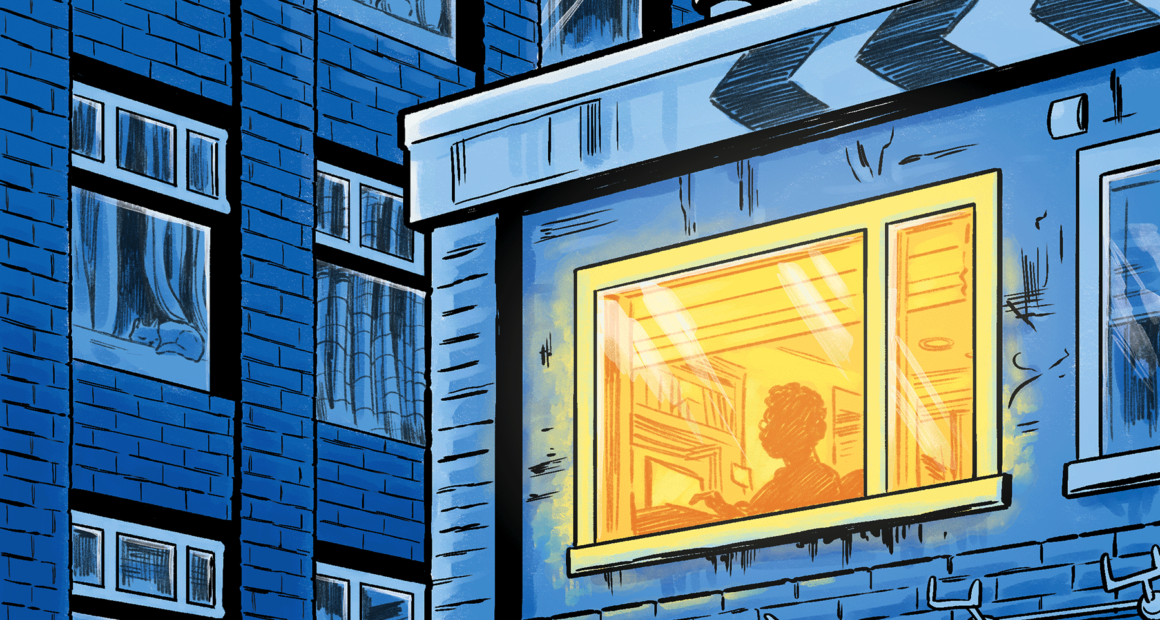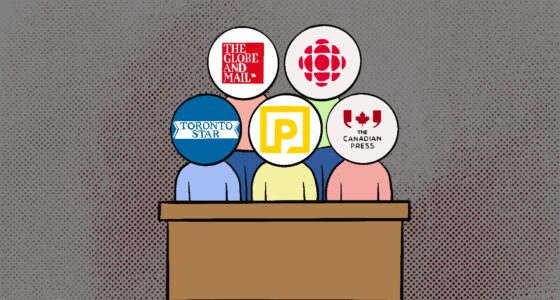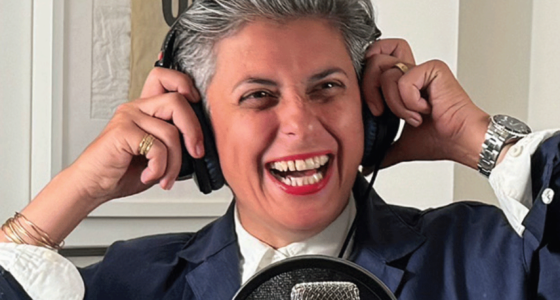Small-team, micro-budget independents and their big ambitions
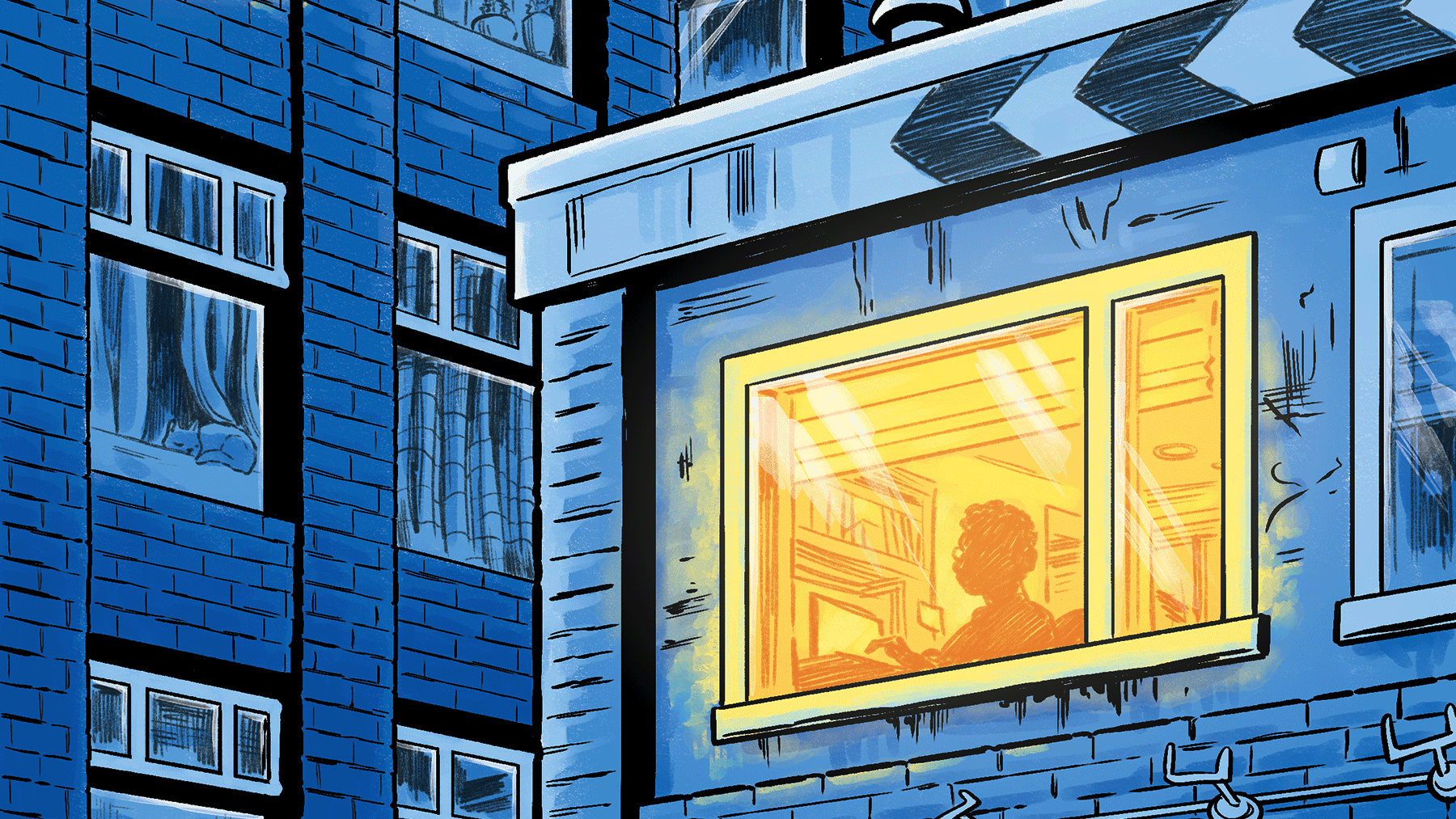
This is not an ordinary newsroom—in fact, it isn’t a newsroom at all. There are no rows of desks with glaring screens or the clinical shine of fluorescent lights panning the ceiling. Instead, this is Davide Mastracci’s apartment. He works from home, writing at his small, square desk, brainstorming from his couch, or pacing through the space following the spark of an idea. With his daily espresso at hand, he works alone to the clicks of a single keyboard.
Mastracci is the managing editor for the opinion section of The Maple, one of Canada’s newest publications covering politics. The inner workings of start-ups like The Maple are far from glamorous, flowing from one computer to the next between coffee shops and apartment complexes. Forget the massive mastheads of yore—The Maple, an online publication launched in August 2021, is overseen by two editors with a goal of putting the working class first in Canada. And there are no philanthropic funders with deep pockets here, either. The Maple is entirely reader-funded.
So why the shoestring budgets and makeshift offices? Because start-ups like The Maple are committing what might have been considered journalistic sin a generation ago: forgoing so-called objectivity in favour of being transparent about their perspectives. In the case of The Maple, that means journalism that argues against the mainstream media’s approach and perspective on political issues.
As part of his study of digital journalism publications, Alfred Hermida, the cofounder of The Conversation and a journalism professor at the University of British Columbia, has examined 150 independent English-language news organizations. He found that start-ups come to life from three distinct groups: veteran journalists with experience working in legacy media who have become disillusioned with the status quo and are looking to restore independent journalism; emerging journalists who do not see the type of journalism they want to do represented by legacy media outlets; and nonjournalists, mainly local activists, who see a gap in the content being produced about their communities. This goes both ways—among publications for left-leaning progressives like The Maple and right-wing publications like Rebel News or True North.
No matter how they’re born, these independent publications strive to put everything on the table for readers, letting consumers decide how they feel about the news they read. Where legacy media often minimize marginalized perspectives, start-ups—like The Maple, The Breach, and The Green Line—say they’re doing the exact opposite. And if they’re successful, these micro, independent newsrooms could be the future of community coverage—from café’s and living rooms across the country.
The Maple began when two organizations morphed into a single publication. It initially started in 2017 as the nonprofit North99, a social media-led campaign providing a voice for working-class issues against rising right-wing media in Canada. Three years later, Mastracci was the managing editor for Passage, another progressive, opinion-based media platform intending to offer space for left-wing perspectives usually not given coverage in mainstream media. In 2021, North99 transitioned to The Maple. This version of The Maple and Passage came together in March 2023 to form The Maple we have today.
Alex Cosh, The Maple’s managing editor for the news section, was the sole editor of the publication prior to the merge. The Maple’s early goal, Cosh says, was to create something different from other left-leaning media in the country, and to do that by becoming “aggressively nonpartisan.” He didn’t want the publication to align with any movement or political party; he instead pursued the kind of content he wasn’t seeing elsewhere in Canada.
Another goal of the publication, shared with its counterpart Passage, was complete transparency of the viewpoints and arguments in its journalism. “I think it’s dishonest to pretend you don’t have a perspective where everyone clearly does,” says Cosh. “It makes for better journalism to be totally upfront.” Mastracci agrees with Cosh, adding that he has always been inspired by adversarial, nonobjective-style journalism; that tracks back to his university years working for The McGill Daily. “I find it more honest because you know where the writers are coming from—they’re not trying to hide their biases,” he says.
That perspective was on full display from the earliest days at Passage. In February 2020, Christie Blatchford, a veteran reporter, passed away. The days after her death were filled with editorials in countless Canadian news organizations praising her legacy, including Maclean’s, CBC, and The Globe and Mail. As Mastracci read through these stories, he noticed there was little critical analysis of Blatchford’s career. He began researching, sifting through countless archived articles from Blatchford’s multidecade career, and scrolling through Twitter in search of critiques opposing legacy media views.
Twelve days after her death, Mastracci published one of Passage’s first articles. In “Christie Blatchford Doesn’t Deserve Her Eulogy,” he addresses alleged accusations of her work being anti-Indigenous, homophobic, and Islamophobic.
“I view post-mortem legacies like concrete, in that there’s a limited time before they dry up, no longer likely to be altered,” Mastracci wrote. “I won’t be able to revise how the late journalist Christie Blatchford’s legacy settles, but I’d like to at least try to scratch in a few words before it does.”
As an opinion writer, Mastracci works alone producing pieces solely through research rather than interviews. He does not allow the use of original interviews in the opinion section of The Maple because he says they take far too long to fact-check and would require more resources than the publication has allotted for the opinion section. In The Maple’s latest transparency report, the publication disclosed an accumulated revenue of $16,668 in donations since the outlets’ merger, from April 20, 2023, to December 31, 2023. Instead, Mastracci may begin his work with a simple Google search, or sometimes, he’s already got a slew of archival documents and databases such as Canadian Newsstream to jump into. That lack of funding or infrastructure to facilitate fact checking in the same way legacy media companies can, however, means stories lack outside perspectives.
Although The Maple has no current plans to expand its editorial team, Mastracci is not worried about competing with mainstream media opinion sections. “I generally find opinion sections of legacy publications to be their weakest links,” he says, since they don’t cover every single viewpoint.
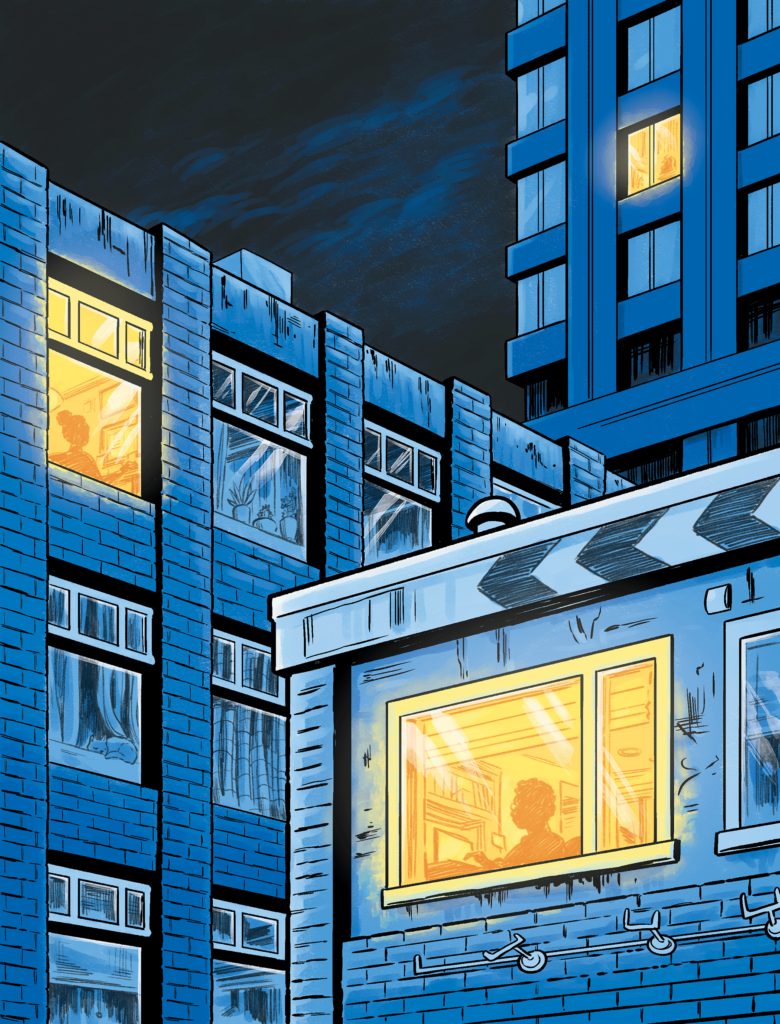
Like The Maple, The Breach was also born out of an existing publication. Eighteen years after The Dominion was published by a group of young aspiring journalists, a band of progressives decided it was time for something new. “Those people got a bit older and a bit wiser, or a lot older and a bit wiser,” says Martin Lukacs, who joined The Dominion as a recently graduated Montreal-based reporter. “We thought, ‘Okay, now feels like a really advantageous moment to try to launch an independent outlet again.’”
In 2021, a crew of diverse voices, journalists and nonjournalists alike, launched The Breach—an independent publication reporting on social issues such as racism, economic inequality, colonialism, and climate change through the lens of leftie social movements and activism. Its name is polysemous, referring both to digging deep into political and public interest stories and the nature of whales breaching the surface of the water as a form of communication.
Lukacs, who has spent more than a decade reporting on Canadian politics, describes the journalism he practises at The Breach as engagé: work that’s politically committed and aligned with the values and aspirations of social movements but also rigorous and credible in nature. “That’s something I learned along the way, trying to juggle being a journalist alongside being a movement activist and thinking a lot about how to do that in a way that was radical but credible,” he says.
Lukacs’ involvement in reporting controversial and underrepresented issues is nothing new. Like Mastracci, his interest in politically driven media also began to accelerate during his time at McGill, when he was 20. While writing for The McGill Daily, Lukacs travelled to Israel and Palestine.
His journey began during a 10-day visit to Israel with Birthright, a free heritage trip for young Jewish people. As it came to an end, Lukacs asked the driver to be dropped off in East Jerusalem on the way to the airport. He remembers his tour guide warning him of the dangers he would face; he promptly ignored them. Where Lucas was left was within walking distance of East Jerusalem, from which he then travelled to Ramallah and Jenin; he spent nearly a month there working with the International Solidarity Movement (ISM), a Palestinian-led campaign implementing nonviolent action against Israeli military occupation.
While in Palestine, much of Lukacs’s time was spent marching alongside the apartheid wall with the ISM in peaceable protest and meeting the many members of the community. “The thing that was most transformative was not being there [in Palestine], but coming back to Canada after that experience and starting to read the mainstream newspapers again,” Lukacs says. “I’ll never forget the emotional experience of it. I remember being so floored by the chasm between the myths that informed what the Globe was writing and the realities that I had seen in the West Bank, and it just seared me with this knowledge of the amorality of Western media that so slants and skews its reporting and its storytelling about Palestinians.”
Lukacs says The Breach, like him, wears its politics on its sleeve. “A phrase that journalists always use, which I don’t particularly like, is speaking truth to power,” he says. “I don’t think power actually cares all that much about the truth.” Instead, Lukacs thinks a more valuable perspective is to speak truth about power. He believes that a lot of journalism gets stuck at what he considers the “first stage” of reporting, where daily issues are covered without connecting them to larger, systemic problems. The Breach tries to connect those dots.
That’s the approach The Breach senior editor Emma Paling brought to her April 2023 story on grocery giants. When Paling came across a press release from the National Farmers Union showing detailed graphs of rising food prices in Canada, she was hooked: “Oh, this is going to be a good story,” she thought.
Paling says that the narrative she was seeing in mainstream media presented the war in Ukraine and the pandemic as the culprits of overall rising inflation, but grocery corporations actually played a huge role. About six days later, she published her short feature “Grocery Giants Are Screwing Canadians—and Farmers Have Proof.”
The Breach claims to show its transparency in coverage like Paling’s by taking a specific stance on a topic as opposed to a general overview of the issues. This stance on transparency comes from the belief that objectivity is an outdated journalistic device. Lukacs says he finds the notion of objectivity in journalism absurd. “No one is absolutely objective,” he says. “We all have perspectives that are coloured by subjective biases.
“We’re just honest about it.”
As a child, Anita Li was “news obsessed.” She would often start her mornings with a copy of the Toronto Star at the breakfast table, then jump in her parents’ car and listen to CityNews 680 on her way to school. After family dinner, she would sit on her living room couch to watch the six p.m. broadcasts of Barbara Walters and Connie Chung. By eight, Li decided to become a journalist; at 14, she was writing freelance articles for $25 at school.
Li grew up in Scarborough, Ontario, in a small, tight-knit community with fall festivals, local sports, and a park where she would meet with her friends. Li knew Scarborough wasn’t perfect, but her perspective of her hometown was quickly challenged when she began attending university in a different district and gradually, as she continued her journalistic work, she noticed the rest of Ontario seemed to focus on Scarborough’s crime and grime.
That’s what inspired Li to start The Green Line in April 2022. It’s a local publication named after Toronto’s Bloor-Danforth subway line, which connects a large portion of the city. Like the subway line, Li wanted to build a publication that would acknowledge and reflect the lived experiences of communities or neighbourhoods seen as undeserving by existing media. Li was also driven to build a publication that she felt was “really deeply ethical and thoughtful from the business and editorial sides of journalism.”
Unlike The Breach and The Maple, The Green Line produces its content via an action journey, which consists of four parts. First, the publication releases an explainer article that unpacks a systematic problem in the city. Then, it publishes a piece of longform journalism on the issue. This is followed by a live event and, lastly, a solutions journalism piece about the results of the event.
It’s crucial, Li says, to build trusting relationships between The Green Line and all communities within Toronto, which is why her publication relies largely on public participation. Each solutions journalism piece, for instance, is born out of a feature. After the feature’s publication, Green Line hosts an event that convenes the writer, sources, and community members to chat about solutions to the issue presented in the initial feature.
In April 2022, The Green Line ran a virtual event, a Zoom meeting where community members discussed the barriers they faced during the pandemic. One woman’s story stood out to Li: she was a resident of Little Jamaica who noticed an uptick in unhoused people in a laneway between a large number of residential houses. This caused a conflict between the area’s residents: some wanted to help address the homeless issue in their neighbourhood and others wanted to keep unhoused people out.For Li, it was a perfect example of The Green Line’s approach.
Though this issue is not exclusive to legacy media, Li says much of their coverage of underserved communities lacks sufficient nuance to accurately reflect the day-to-day lives of those in them. This can often erode trust between these populations and journalists. The lack of coverage of the homelessness crisis in Toronto, Li says, is one clear example of legacy media’s failure to adequately represent underserved communities. She feels mainstream media focus too much on perspectives of policy makers, politicians, or charitable organizations when covering the unhoused crisis, as opposed to those directly affected by homelessness, which leads to gaps in reporting. To tackle that, The Green Line published “‘Golden Age of Homelessness’ Is Over, Says Former Homeless Man,” following a day in the life of a formally unhoused individual living in Toronto, representing the reality of the search for permanent housing.
An unbalanced representation of the public, she adds, can prompt people from underserved communities to turn away from the news, which can be detrimental. “Journalism is so essential for democracy, it’s a pillar of democracy,” she says. “It’s a way for people to be informed so they can actually make better decisions in their lives,” which is what The Green Line aims to achieve with its work.
The Green Line also provides public documentation and up-to-date information about funding and partnerships, as well as acknowledgement of the personal backgrounds of all part-time fellows and interns involved with creating content for the publication.
Another aspect of the publication’s transparency is the Fact-Check Yourself section of each article published on the site, which provides links to the story’s sources of information. This supplies readers with the chance to form their own opinions around the topic being covered and the legitimacy of the publication.
Li’s take on the role transparency should play in journalistic institutions comes from the “old school” understanding of the journalism she was raised with. “I really care about the function of journalism, which is to show rather than tell,” she says. “I find a lot of publications these days are pushing opinions on people and I think it’s so dangerous to tell people what or how to think.”
There is a sense of freedom that comes with independent media publications, allowing contributors to more readily participate in the production of journalism. But this shift toward a small or nonexistent newsroom culture means editorial communication can become difficult.
Nora Loreto is a Quebec City-based writer and activist who has spent the last 15 years as a freelance journalist. Loreto worked as a columnist at Passage, now The Maple, and was subsequently brought on as a journalist for The Maple. But last fall, Loreto ceased her work with the publication’s opinion section. While she enjoyed her experience as part of the news team, her work as a columnist was less pleasant. “You get tired of pitching,” she says. “At some level it’s like either I have a column and I get to write what I want…or I don’t get to write what I want and then it’s not a column.”
Mastracci says that since the merger, The Maple’s collaborations with freelancers for the opinion section have declined significantly. He says the change was not intentional, but checking the publication’s financial spreadsheet, he noticed that aside from the newsletter, it hadn’t commissioned a single piece on the opinion side between July and September 2023. Mastracci says this allowed the outlet to save money without complaint from the readership.
According to Alfred Hermida’s research, one of the major issues for online journalism organizations in Canada is financial sustainability. Creating sustainable business models and figuring out how to keep a local enterprise up and running is still a question for many start-ups without the income to advertise effectively. This conundrum has led many, including legacy media, to reader revenue through membership, donations, and community support.
The media policy environment in the country is also a major issue for independent journalism. It’s not that these outlets are being snuffed out—they simply are not the focus of these policies.
But even with these challenges, the individuals who have created these platforms with the intention of changing journalism have continued to persevere.
“I’m running a start-up, I’m a solopreneur. I invested in my own business. I don’t come from wealth or anything like that, so it takes time to get to a point where the publication will be making more money,” says Li about her experience launching The Green Line. “I always wanted to do this, I worked really hard toward it.”
Lukacs says that though running an independent publication is an “exercise in bootstrapping,” the ability to pay The Breach team living wages while doing the unapologetic journalism they set out to accomplish is a great reward.
“If you had asked me 10 years ago to imagine myself doing full-time media work without compromising my left-wing politics, I would have told you to stop being cruel,” says Lukacs. “But the truth is we’re at the start of a renaissance of independent, progressive media in Canada. I think it’s only going to get better.”
The writer of this article was not involved with the Review of Journalism’s collaboration with The Breach.

